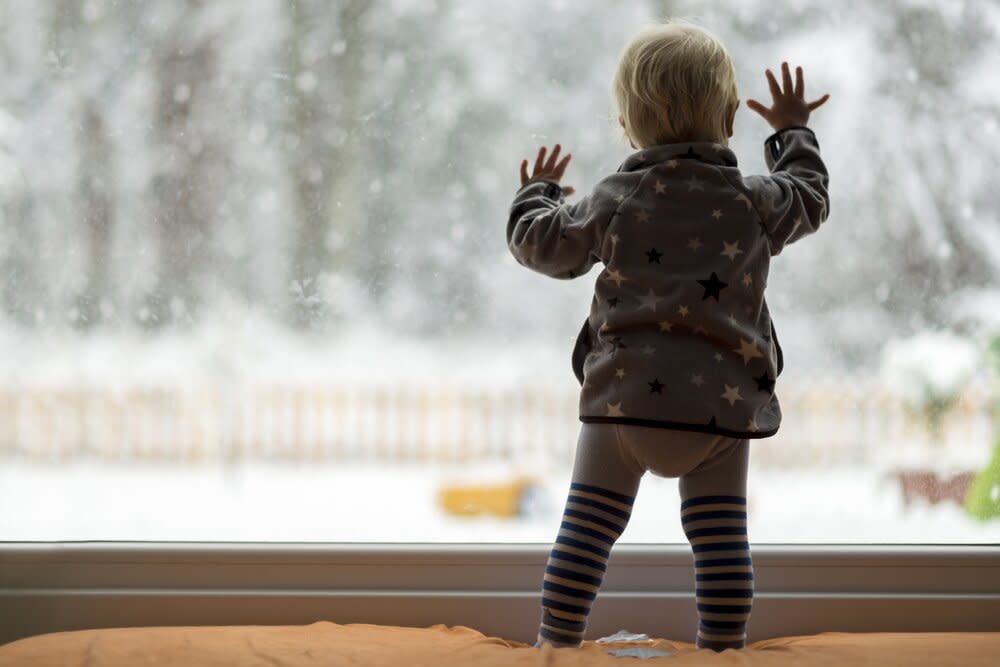How to Protect Baby’s Skin in the Winter

Shutterstock
Frostnip
This mild form of frostbite makes skin red and tender. "Exposed skin, fingers, and toes are particularly susceptible," says Parents advisor Jody Alpert Levine, M.D., a pediatric dermatologist in New York City. "When your baby gets cold, it's a natural reaction for their body to send less blood to their extremities in order to keep their vital organs warm."
The Solution: Dress your baby in mittens and a hat or hood, and don't stay out too long. Extend the cover on your stroller to block the wind. If your baby's skin looks red, give them a lukewarm bath. Call your doctor if their skin color isn't normal in a couple of hours.
Chapped Lips
Babies' lips are always wet thanks to drooling, lip-licking, and drippy noses—and that moisture can break down the protective top layer of skin. This leaves lips vulnerable to cold, windy air, says Sandra Marchese Johnson, M.D., a dermatologist in Fort Smith, Arkansas.
The Solution: Apply a thin layer of petroleum jelly or lip balm to create a barrier against the elements and to moisturize already-chapped lips.
Heat Rash
Heat rash isn't just a summer thing. If your baby's bundled up, they can become overheated in the winter, too. Itchy red bumps appear when tiny sweat glands get clogged.
The Solution: Dress your baby in breathable layers, and remove one if he's hot. Use a 1 percent hydrocortisone preparation to help with the itchiness, suggests Dr. Johnson. The rash will go away on its own after a few days.
Rough Red Cheeks
Chapped skin—which gets ruddy, peeled, and even cracked—usually strikes the face, bottom, or spots where skin rubs, like the folds at the wrists. "Chapped skin is basically dry skin that has become inflamed," says Peter Lio, M.D., a clinical assistant professor of dermatology and pediatrics at Northwestern University Feinberg School of Medicine in Chicago. Blame anything irritating: wind, friction from clothing, drool on the chin, a runny nose, or a wet diaper.
The Solution: Spend as little time in the elements as possible, and bundle them up when you do go outside. Using a thick moisturizer such as Eucerin, Aquaphor, or petroleum jelly on your baby's cheeks (or other problem areas) will add to his natural barrier and help treat any skin that's already chapped.
Dry Skin
Dry, flaky skin can appear anywhere on your baby's body, especially on his face. It's particularly common during the winter because cold air doesn't carry as much moisture as warm air.
The Solution: It's fine to bathe your baby every day; just don't use water that's too warm. "Avoid soap or shampoo that contains fragrance or alcohol," says Robert D. Greenberg, M.D., a dermatologist in Vernon, Connecticut. Make sure you smooth a non-perfumed moisturizer such as Eucerin on their skin within two minutes of the bath.
Eczema
Extremely dry, itchy skin tends to run in families. Babies with eczema have an insufficient barrier on their skin for keeping moisture in and irritants out. Like run-of-the-mill dry skin, eczema tends to flare up during the winter.
The Solution: Exposing your baby's skin to water twice a day will help keep it hydrated. When you bathe them, use a non-soap cleanser only on their underarms, backside, groin, and feet, and use water to wash the rest of their body. (Again, avoid products that have color or fragrance.) Within two minutes of getting them out of the tub, spread on a moisturizing cream or ointment like Vaseline or Aquaphor to seal in the water. At another point during the day, use warm water from the sink to blot their skin, and then immediately apply moisturizer, suggests Dr. Levine. If eczema doesn't improve, talk to your pediatrician—your baby may need a prescription anti-inflammatory cream.
Flaky Skin
Cradle cap is a very common condition that occurs when the oil glands on the scalp go into overdrive. Greasy yellowish scales can cling to the scalp, hairline, and the skin behind the ears.
Skin Saver: Cradle cap is harmless and will go away on its own by the time your child is 6 to 8 months old. If it bothers you, there are a few things you can do to help remove the scales. "Try rubbing baby or olive oil into the scalp to loosen the flakes, then carefully brush them out before shampooing," suggests Parents advisor Jennifer Shu, M.D., a board-certified pediatrician in Atlanta.
Sunburn and Skin Cancer
Don't forget to use sunscreen in the winter—UV rays are still strong.
The Solution: Choose a broad-spectrum sunscreen with SPF 30 or higher. In the first six months, use one that contains physical blockers, such as zinc oxide and titanium dioxide.

